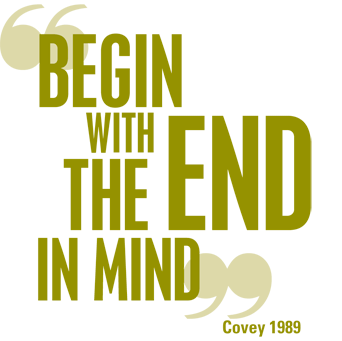Blog
Guest Post: Begin With the End in Mind
If the title of today’s post sounds familiar, you’ve likely read Stephen Covey’s The 7 Habits of Highly Effective People. In it, Covey examines the seven habits he proposes are essential to helping us attain goals and achieve success.
 Covey’s second habit – Begin with the End in Mind – is quite useful for students who struggle with executive function. Covey describes this habit as “the ability to envision in your mind what you cannot at present see with your eyes.” Cooper-Kahn & Dietz, in their book Late, Lost and Unprepared, define executive function as a set of processes that aid in helping managing one’s self and resources in order to achieve a goal. With his second habit, Covey argues that if we begin a process by looking forward as to what our goal will look like when we complete it, we can more readily figure out the steps we need to put in place to get there. Sarah Ward, a well-known local expert on executive function, also speaks to the idea of starting with one’s end point clearly in focus and the notion of visualizing what a goal will “look like when it’s done.”
Covey’s second habit – Begin with the End in Mind – is quite useful for students who struggle with executive function. Covey describes this habit as “the ability to envision in your mind what you cannot at present see with your eyes.” Cooper-Kahn & Dietz, in their book Late, Lost and Unprepared, define executive function as a set of processes that aid in helping managing one’s self and resources in order to achieve a goal. With his second habit, Covey argues that if we begin a process by looking forward as to what our goal will look like when we complete it, we can more readily figure out the steps we need to put in place to get there. Sarah Ward, a well-known local expert on executive function, also speaks to the idea of starting with one’s end point clearly in focus and the notion of visualizing what a goal will “look like when it’s done.”
Students that struggle with executive function often have difficulty initiating tasks, planning (short- and long-term), and following multi-step directions. By helping a student begin with the end in mind, they can visualize what the end product will look like. And when they know what that end product will look like, they can achieve their goal by working backwards and figuring out the steps they need to take to get there. This is a great model to help students see the bigger picture (“I’d like to make honor roll this term” – what will it take to get there?) as well as aiding them in getting through an individual assignment or project (“What will my paper look like when it’s done?” “What will it look like when my room is clean and tidy?”).
You can “begin with the end in mind” in a number of different scenarios such as packing a backpack (picture what it looks like when your backpack is ready to go to or from school), writing a research paper (note how long it needs to be, how many resources need to be cited, etc.), or – one of our favorites here at Engaging Minds – by making an agenda before starting homework.
Dr. Howard Abikoff and colleagues at NYU School of Medicine have been studying goals-based training for some time and their findings are quite promising. They recently conducted a randomized controlled trial of 3rd to 5th graders with organizational difficulties. In those children whose parents and teachers were trained to reinforce children for meeting end-point target goals, significant improvements were seen in Children’s Organizational Skills Scales (COSS-Parent, COSS-Teacher), homework performance and family functioning (Abikoff H, 2013).
By beginning with the end in mind, as suggested by Covey and others, your child is visualizing his way to victory by having in mind a clear goal and a solid endpoint. While he will still need to put in place the steps to reach this target, your student can work backwards to create a path to success.
Guest author bio:
Sarabeth Broder-Fingert is a pediatrician at Massachusetts General Hospital for Children and a fellow at the Center for Child and Adolescent Health Policy. She has long been interested in how education and community resources affect the health and well being of children. She has published on a wide variety of children’s health related issues including hospital care for children with autism, puberty, celiac disease and international mental health care. Her current research interests include expanding the medical home model and improving care for children with special needs. Sarabeth received her BA and MA in biology from Wesleyan University. She received her MD from NYU School of Medicine and completed her residency training at Massachusetts General Hospital. She is currently enrolled in the Masters in Public Health program at the Harvard School of Public Health. Sarabeth has been a member of the Engaging Minds Advisory Board since 2012.

